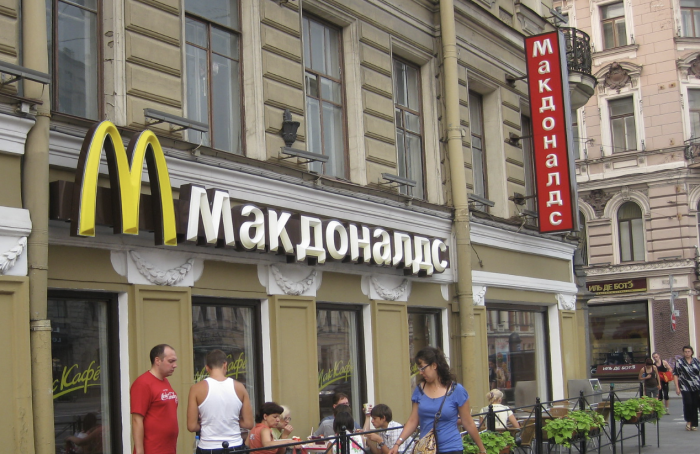As we are celebrating McDonald’s and other brands halting their business in Russia, we also have to talk about purchasing power parity.
First of all, I don’t claim that human rights aspects played no role in these decisions, but it would be slightly naive to think that ethics were the only explanation.
To understand this move, we need to take a look at purchasing power parity (PPP).
Did you ever travel to a foreign country and got excited about low prices?
I remember spending six months in Morocco. My apartment right next to the beach cost $180 per month. Dinner in a decent restaurant was around $5.
In my perception, things were cheap, but my Moroccan friend, who earned around $150 per month, had a different opinion on this.
And that’s the basic idea of PPP.
Prices are relative. It highly depends on what the average person actually makes per hour and what the currency of a country is worth compared to other currencies.
But let’s not make this too complicated.
A few years ago, The Economist came up with a simple but comprehensive theory explaining all of this. It’s called the Big Mac Index.
This index compares the price of a Big Mac in different countries. They picked this product because it is available in (almost) every country on this planet—almost.
In January 2021, a Big Mac cost $5.66 in the United States. That is the reference point of the index. A person in Switzerland had to pay $7.30, and Indian customers only had to pay $1.62.
The difference between these two extremes is an indicator of the gap between the income of an average person in Switzerland compared to India. But it’s not only about salaries. As McDonald’s operates worldwide, exchange rates also play a huge role in this.
Back to Russia.
In January 2021, a Big Mac cost $1.81 in Russia, which was the equivalent of 135 Russian rubles at that time. As you might have heard, the Russian economy and currency crashed after they attacked Ukraine.
If McDonald’s would change the pricing of a Big Mac according to the current state of the Russian economy, it would probably cost less than half a dollar—and that’s not profitable.
The same goes for Starbucks, Coca-Cola, and all the other brands who discovered their passion for ethics a few days after the Russian currency crashed.
So, maybe this is a more realistic explanation of Russia becoming a “no-fry-zone.”
At the same time, McDonald’s announced that they will continue to pay their workers in Russia. That’s a nice move, but let’s not forget that they don’t pay them in dollars. As President Biden pointed out this week, “One ruble is now worth less than one American penny.”
If the war stopped tomorrow, you could probably fly to Russia and buy an apartment for $1.000 (if you pay in dollars). Sounds weird? No, that’s exactly what happened in the 90s after the collapse of the Soviet Union.
Anyone with dollars was able to purchase companies, real estate, and influence in Russia. But this dynamic is affecting economies around the world. That’s also the reason why certain countries like China limit foreign investors and insist on not trading their currency on global markets. If they did, “we” would have bought them 20 years ago.
Russia made that mistake in the early 90s—and that’s one of Putin’s main narratives.
Back to the heroic American corporations halting their business in Russia. As long as the Russian ruble isn’t worth anything, McDonald’s and others cannot extract any money from Russia. They are already worried about not getting their bills paid.
I am not saying the pressure of public opinion had nothing to do with these moves. But let’s also not forget we are not talking about NGOs here. We are talking about some of the biggest corporations on this planet.
And all of this leads us to the million-dollar question, “Is it fair that the same amount of money has a different value in different places?”
What does that mean for international trade? And wouldn’t it be better to have a global currency that is not controlled by one country?
Not to forget, what happens if sanctions lead to a secondary financial system used by all nations that don’t have access to the dollar?
These are questions that will dominate the next decades. The war in Ukraine is the beginning of a new era. The Western world celebrated in 1990 when McDonald’s opened their first restaurant in Russia—and now, we celebrate them for shutting down their business.
In this case, PPP hits Russia hard—and well-deserved.
But as you can imagine, this is not the first time exchange rates have ruined the economy of an independent nation. And I think that is not fair.
Higher gas prices have the power to change our lifestyle, but imagine living in a country without a stable currency. Ask our friends in Lebanon, Argentina, and elsewhere how that feels.
We could have talked about this earlier, but we were busy flying to Thailand for 100 bucks and having dinner for a dollar on a street market. I was enjoying my comparably cheap apartment in Morocco. Thousands of Western hippies can’t wait to travel to India for a cheap holiday.
But maybe, just maybe, it’s also time to take a deep breath and ask ourselves, “How does this feel on the receiving end?”
Read here: The Bank Scheme you Haven’t Heard of (& How they Stole my Money).









Read 6 comments and reply